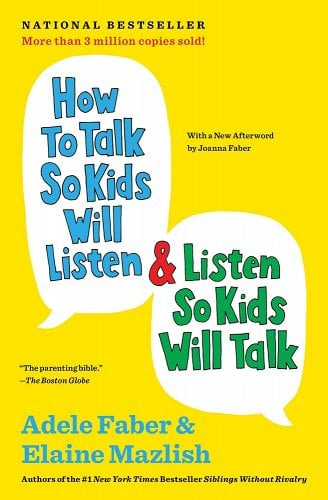The best book for learning how to communicate with publishing professionals....is unfortunately also a 43-year-old classic on how to parent small children
You must read HOW TO TALK SO KIDS WILL LISTEN AND LISTEN SO KIDS WILL TALK if you want to be a Good Art Friend (and effective publishing communicator).
And a mom and a literary agent, I’m obsessed with this book:
A parenting classic written by two teachers at the New School for Social Research’s Family Life Institute, How to Talk So Kids Will Listen… is a masterpiece.
It’s also, to be clear, not a Neon title or the pet project of an editor friend or anything like that. It originally came out 5 years before I was born. I just love it.
Do not be like me and wait until Carolyn Hax has recommended it in like 16 consecutive columns before you finally give in and check it out of the library to see what that whole boner is about. If you haven’t read it, do so now.
Even if you don’t have children. Even if you don’t like children.
This is a parenting book, yes, but more specifically, it’s a self-parenting book. Two utter mensches radiating Kind Mom Energy (one of whom is still alive at age 95!!) guide their adult readers toward a practice of mature, healthy, empathic, effective communication with people they care about. That the subject of concern is purportedly “the children” is not so much true as it is a face-saving mercy offered by two authors determined to help parents become their best selves.
It’s tough to leave this book without a little more self compassion and self esteem, but even if you’ve still got very little of both, you’ll at least learn how to communicate like you have a lot.
Faber and Mazlish teach the art of standing up for oneself without being an asshole or a big baby. They model how to maintain strength and flexibility at the same time: strength to uphold your boundaries and believe in your vision; flexibility to absorb outside expertise and guidance and use whatever of it is beneficial.
Useful as such skills may be for parents and children, they are even more so for authors. And agents. And editors. And friends and family who want to be supportive.
As I have said in here many times before, book publishing is one of those industries characterized by, shall we say, a higher-than-average amount of emotional dysregulation overall. Think about it: we’re a bunch of overfunctioning artistes working ourselves to the bone in a deeply vulnerable, wildly confusing, not-usually-all-that-remunerative environment.
Growing up, most of us are or were the single most perceptive people we knew. And in many if not most of our cases, such perceptive talent was a product of hypervigilance, which was itself a product of trauma. WHAT COULD GO WRONG?
The people who “win” in this industry—by which I mean “end up in the quartile of the scattergram you want to be in, assuming commercial success on one axis and sanity on the other”—are people who communicate with emotional maturity. Ideally they also are emotionally mature, sure. But communication is the most important part —at least when it comes to getting support, feeling supported, and getting your colleagues to do their best work for you.
Emotionally mature authors get more attention from their editors and publicists. They get more praise and loyalty from readers. They write better books.
Emotionally mature literary agents sell more books and get more money for their clients. I have no hard data for this, but there’s no way it’s not true, at least in the long run.
(Sure, it’s possible to get your client max money by being a manipulative terrorist once, but if you keep burning bridges, you ain’t gonna have much standing for getting them or anyone else primo deals in the future.)
Emotionally mature editors make more insightful edits, give more effective sales presentations, and get stuck less over their manuscripts (due to overfunctioning perfectionism freezes or avoidant shame spirals).
Emotionally mature friends and family actually support authors vs. failing in their attempts.
In short, it rull good to be emotionally mature and communicate with emotional maturity. And How to Talk So Kids Will Listen teaches us how.
Let’s walk through some of the book’s main lessons “for parents” and their extreme applicability to life in book publishing. In no particular order:
Keep reading with a 7-day free trial
Subscribe to How to Glow in the Dark to keep reading this post and get 7 days of free access to the full post archives.


